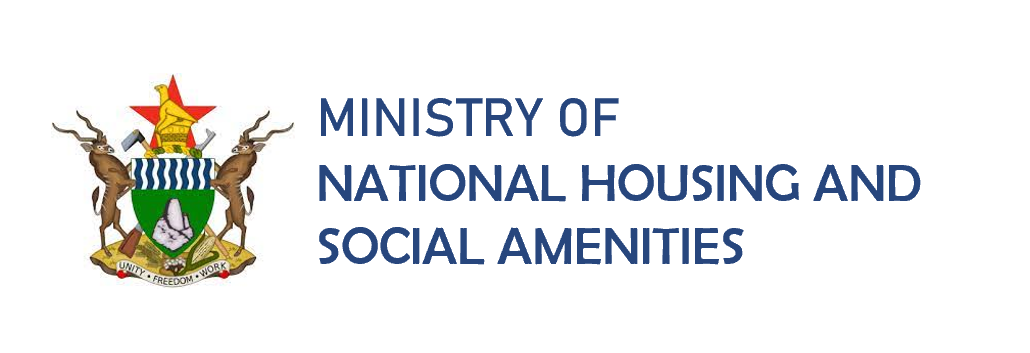About the Ministry
Welcome to Ministry of National Housing and Social Amenities
The Ministry of National Housing and Social Amenities seeks to fulfil its mandate of providing shelter as enshrined in the Constitution of Zimbabwe, Amendment Number 20 of 2013, Section 28.
Access to shelter comes in twofold; that is home ownership and rental. Homeownership refers to a situation where the beneficiary buys the property through outright purchase or rent-to-buy from Government, Local Authorities, or the private sector. Security of tenure for this kind of transaction comes in the form of title deeds while preceded by an agreement of sale or lease with an option to purchase.
The Ministry is driven by the desire to contribute significantly towards the achievement of Vision 2030, whose mantra is; ‘Towards a Prosperous and Empowered Upper- Middle – Income Society by 2030’
Vision
Modern and Affordable Human Settlements for Zimbabweans by 2030.
Mission
To lead in the provision of human settlements in a coordinated and sustainable manner through the facilitation and promotion of functional housing and social amenities for all Zimbabweans.
Core Values
- Professionalism
- Environmental
- Transparency
- Innovativeness
- Flexibility
- Accountability
Mandate
The Ministry of National Housing and Social Amenities is mandated to spearhead the formulation and implementation of policies in the Housing Delivery sector. the ministry is also a key player in the provision of adequate housing and social amenities to the citizens.
Management

Minister :
National Housing and Social Amenities:
Hon. Daniel Garwe (MP)

Deputy Minister : National Housing and Social Amenities:
Hon. Yeukai Simbanegavi (MP)
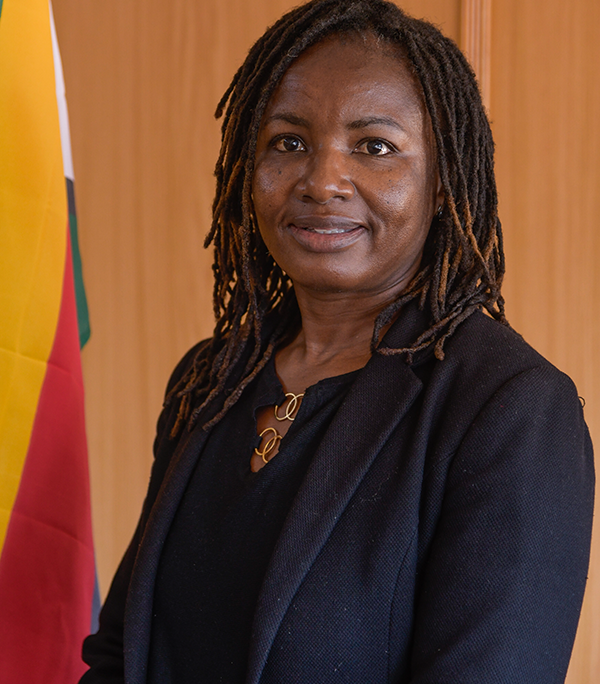
Permanent Secretary: National Housing and Social Amenities:
Eng. Joy P Makumbe

Chief Director :
Estates Development and Maintenance:
Kudzai Rimai
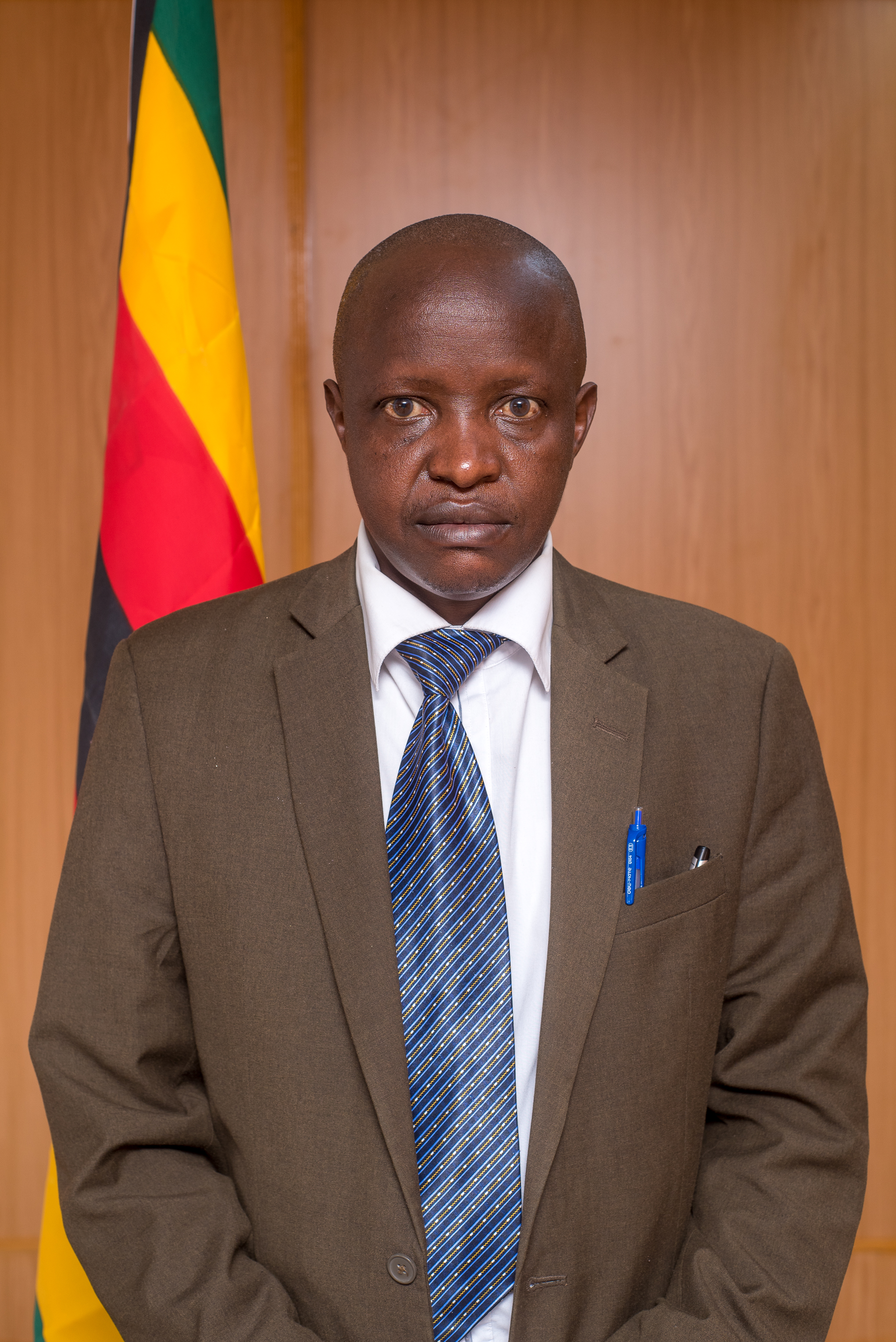
Chief Director:
Housing Development:
Anastance Ncube
Zimbabwe’s economic environment is increasingly attracting the attention of serious investors. The New Dispensation has made the country a preferred destination for Foreign Direct Investment. The country’s growth is certainly poised for a quantum leap as evidenced by the developments in the infrastructure, agriculture, manufacturing and commercial sectors. This positive outlook requires adequate, modern and sustainable housing delivery.
The mandate of my Ministry is to deal with Human Settlements which are bedevilling our country. The Ministry was created by His Excellency, the President of the Republic of Zimbabwe, CDE, DR. E. D. Mnangagwa, taking cognisance of the demand for housing in the country. Housing as in residential property, social amenities such as schools, clinics, hospitals, shopping centres amongst others. My Ministry is much aware of the President’s vision of achieving a prosperous and empowered upper-middle-income society by 2030.
Our programming is now driven towards providing sustainable and affordable human settlements by 2030. Sustainable in the sense that the settlements must be resistant to; climate change, earth tremors, flooding, drought, or its effects and must speak to modernity. Modern designs should be crafted to suit the vision enunciated by His Excellency the President.
Plans are afoot to revise building standards in liason with local authorities and in consultation with the Ministry of Local Government and Public Works. The Government is seized with the provision of land at affordable prices, to broaden accessibility. Models and strategies are being put in place, while partnership arrangements with the private sector and financial services institutions are underway to find ways to enhance housing access by the greater part of our population.
The Ministry of National Housing and Social Amenities will endeavour to abide by the notion of social inclusion as one of the key pillars in ensuring that no one is left behind in all housing and social amenities programmes and projects. As outlined in the National Development Strategy blueprint, government will acquire more land for housing development. A collaborative approach will be taken as more opportunities will be opened for the private sector to provide infrastructure and financial resources. The programme is taking all on board and will be driven by modern designs for both urban and rural areas.
Land is a finite resource, as such, we cannot continue building horizontally as we might end up exhausting prime land. The densification model will be the way to go while intensified by the construction of walk-up flats, taking cognisance of vertical space utilisation. The National Human Settlements Policy which now awaits launch by His Excellency the President of the Republic of Zimbabwe, CDE, DR. E. D. Mnangagwa, addresses all these issues.
The country is facing a daunting national housing backlog hovering beyond 1.25 million units, with social amenities infrastructure also in deficiency. The Ministry will strive to take advantage of the economic stabilisation which the country has attained and explore various models to deliver housing and social amenities infrastructure.
Regularisation and sanitisation of informal settlements shall be employed in order to rectify past mistakes through building back better. Government shall be conscious of the constitutional provision on arbitrary evictions, however, in instances where people have settled on undesignated sites such as wetlands, river basins, road servitudes, wayleaves, land earmarked for social amenities and any other designated use; relocation to appropriate places will be effected.
As the Minister of National Housing and Social Amenities, I look forward to bilateral engagements with current and potential local and international investors in the housing sector. The government, my Ministry, and the people of the Republic of Zimbabwe do welcome engagements aimed at improving human settlements.
Honourable D. Garwe (MP)
Minister of National Housing and Social Amenities
The Ministry of National Housing and Social Amenities will endeavour to effectively and efficiently deliver its mandate of developing sustainable human settlements in the country, based on the vision, mission, core values and key strategic initiatives which set out necessary guidelines. It is critical to have an efficient housing delivery system which ensures provision of adequate housing and efficient social amenities while catering for the basic needs of the wider stakeholder community
In order to contribute to the Nation’s 2030 Vision, the Ministry of National Housing and Social Amenities has developed, through a highly consultative process, the appropriate policies and programs for the promotion of sustainable, affordable, climate-proof, modern and smarter settlements. Achieving this vision will require a significant level of adaptability and flexibility to be able to proactively respond to the stakeholder priorities, in tandem with the dynamic operating environment. As enunciated by His Excellency, the President of the Republic of Zimbabwe, Cde E.D. Mnangagwa, the Ministry is aiming ‘towards a Prosperous and Empowered Upper- Middle-Income Society, as well as towards Agenda 2063’s vision of making Zimbabwe a part of “The Africa We Want’’.
Honourable Y. Simbanegavi (MP)
Deputy Minister of National Housing and Social Amenities
The Ministry of National Housing and Social Amenities is mandated to provide shelter to the populace of Zimbabwe as enshrined in the Constitution of Zimbabwe Amendment Number 20 of 2013, Section 28.
The Ministry is therefore working towards improving access to modern and affordable housing by 2030. Access to shelter comes in twofold, that is homeownership and rental. Homeownership refers to a situation where the beneficiary buys the property through outright purchase or rent-to-buy from Government, Local Authorities, or the private sector. Security of tenure comes in the form of title deeds preceded by an agreement of sale or lease with the option to purchase.
Rental accommodation is where the occupant of the property is leasing from a lessor. The security of tenure comes in the form of a lease agreement. The property is owned by the landlord. However, in the majority of cases in Zimbabwe, there is no written lease agreement between the lessor and the lessee, especially in the high density areas. Thus, it is the priority of this Ministry to conscientize and encourage the lessor and the lessee to consider written lease agreements. The written agreement assists in the event of disputes between the two parties.
The Ministry is driven by the desire to contribute significantly towards the achievement of Vision 2030, whose mantra is “Towards a Prosperous and Empowered Upper-Middle-Income Society by the Year 2030″. The quality of housing and social amenities is a barometer deployed to measure the extent of the upper middle-income society. Therefore, access to decent, modern, functional and sustainable human settlements is of paramount significance and forms the vital cog towards the achievement of Vision 2030.
It is not the sole responsibility of the government to directly provide housing and social amenities. The major role of the Ministry is to facilitate the provision of the same. The Ministry intends to ensure that housing delivery is private sector driven and there are equal opportunities. The government will only come up with interventional programmes such as social housing which is less lucrative to the private sector which is driven by profit margins.
The anchor thrust of the Ministry comes from crafting the necessary policies and legislation coupled with the removal of bottlenecks and bureaucratic red-tape. For starters, the Ministry has a new Zimbabwe National Human Settlements Policy (2020), whose vision is “Towards well-planned and well-governed human settlements”. This policy informs the review of the necessary legal framework and requisite institutional arrangements.
Housing delivery is the Ministry’s thrust while adopting the densification trajectory, cognisant of the fact that land is a finite resource. Zimbabwe has an agro-driven economy. Prime agricultural land needs to be preserved as such. In the years gone by, urban sprawl was the order of the day. Thus, settlements were cited in areas far from bulk infrastructure, breeding squatter settlements that lacked basic infrastructure services.
There are as many social amenities as there are players in the provision of the same, for instance, Micro-Small and Medium Enterprise workspaces, schools, churches, health centres, sports, and recreational facilities, water, sanitation, and hygiene infrastructure. However, there is a critical shortage of Social Amenities to match the requirements of the communities. The main function of the Ministry is to promote and facilitate the provision of Social Amenities by diverse stakeholders and in some instances direct provision in conjunction with respective local authorities.
Climate change has adverse effects on infrastructure provision. The Ministry is alive to this phenomenon. There will be a collaboration with relevant stakeholders in the energy sector for green energy, the environmental sector for ecological protection, and also disaster management for disaster risk mapping. Settlements planning will have to adhere to the Regional Town and Country Planning Act, the Zimbabwe National Human Settlements Policy, the Energy Policy, and the Environmental Management Act, among other statutes, to address the challenge of climate change.
Informal settlements continue to pose a threat to Vision 2030. Hence, the Ministry’s drive to ensure that the challenge is addressed sustainably. Settlements in wetlands, river basins, riverbanks, and social amenities space, must be addressed through compulsory relocations and reclamation of the land. Citizens will not be victimised, rather, alternative accommodation will be prepared before relocations and eventual demolitions to reclaim the land. However, if the informal settlements are located on idle land for housing development, regularisation will be instituted through in-situ upgrading.
Some suburbs have run their race and therefore require regeneration. Vision 2030 demands that these houses be retired. This would entail instituting urban regeneration programmes in such suburbs. The strategy of choice is to utilise existing open spaces suitable for housing to build flats, maximising vertical space utilisation. These new units will be used to decant the old units, build replacements, and relocate people incrementally.
The Ministry is also driven by the desire to witness urban to rural migration, as opposed to rural-urban migration. In line with Devolution, the Ministry through its decentralised structure endeavours to ensure that rural housing is brought to the fore. Planned rural settlements with requisite infrastructure are a possibility. Settlements at rural service centres, district service centres, and growth points should be commensurate with what is obtaining in urban centres. Provision of decent and modern housing and social amenities; decentralisation of Government services, industry, and commerce (regardless of size) will be the pivot for the development of these centres.
Together, we can achieve the country’s Vision 2030 of an Upper Middle-Income Society and the Ministry’s drive towards well-planned and governed human settlements.
Eng. P. Joy Makumbe
Permanent Secretary
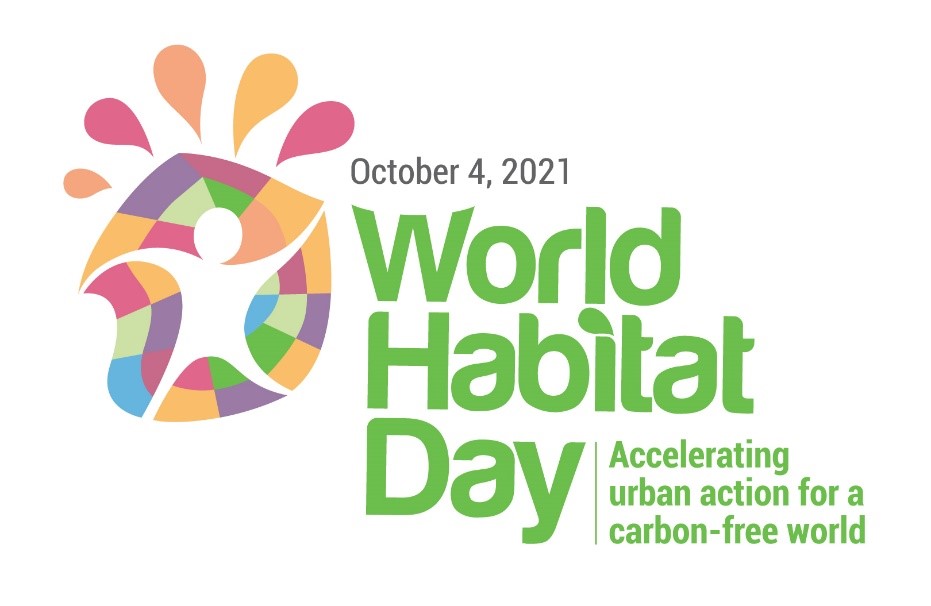
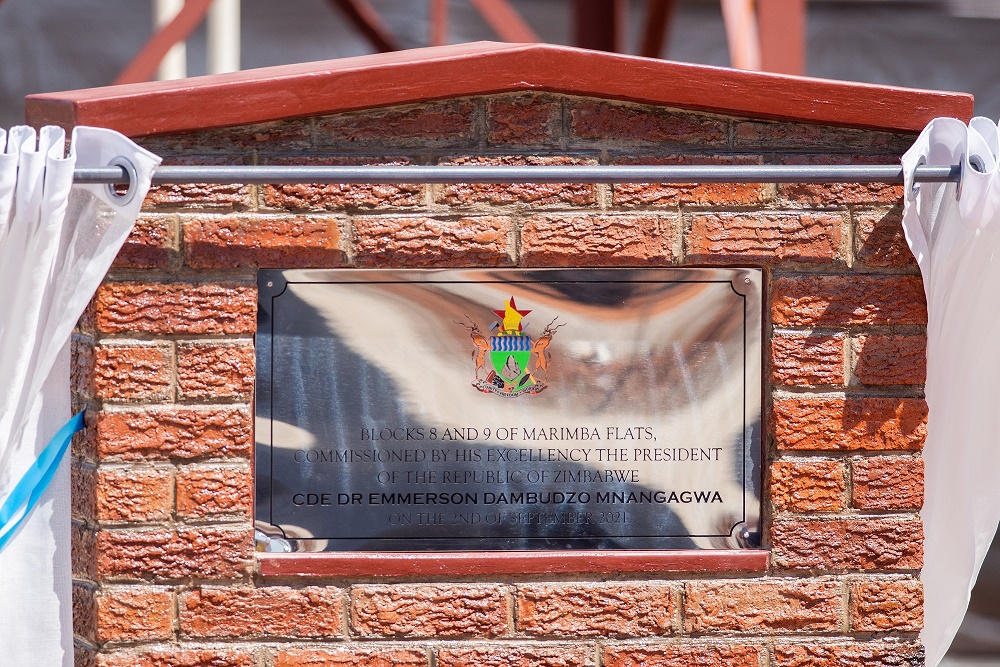

MINISTRY FUNCTIONS
- Formulate and monitor implementation of sustainable national housing and social amenities policies in urban and rural areas for inclusive and sustainable development.
- Develop and implement strategies that ensure urban and rural housing and social amenities development in consultation with relevant Ministries and other stakeholders.
- Facilitate the provision of affordable housing and social amenities infrastructure in urban and rural areas.
- Coordinate and mobilize communities for the provision and maintenance of social amenities and infrastructure in urban and rural areas, for example, housing, clinics schools, dip tanks, roads, bridges, piped portable water supply schemes, rural electrification, and sporting and recreation facilities.
- Develop and implement programmes that promote integration of housing and social amenities facilities.
- Develop frameworks that align with international protocols and conventions on housing and social amenities development.
- Mobilize resources for the implementation of housing and social amenities in urban and rural areas including Public Private Partnership models.
- Coordinate and implement the Rural Housing Delivery Programmes
- Manage and account for, the Civil Service Housing Loan Fund, National Housing Fund, Rural Housing Fund, Housing and Guarantee Fund and Social Amenities Development Fund.
- Administer rent control regulations for residential accommodation.
- Manage and maintain Government housing estates.
- Coordinate the allocation of housing in accordance with Ministry policy and facilitate the processing of title deeds.
- Develop and monitor housing allocation criteria for all Local Authorities.
- Acquire land for urban and rural housing development.
- Regularize housing developments including housing cooperative schemes in consultation with relevant Ministries
- Prepare and implement, Model Housing and Developments Plans for rural and urban settlements
- Develop National Housing and Social Amenities standards and ensure compliance
- Ensure compliance to national housing and social amenities development standards
- Guide the siting and classification of human settlements
- Facilitate the implementation of Spatial Plans and standards for national housing and social amenities
.
Departments and their functions
- Develop and implement policies and strategies that ensure sustainable urban housing development in consultation with local authorities, relevant Ministries and other stakeholders
- Manage urban housing programs in accordance with Ministry policy.
- Promote appropriate housing and social amenities designs and technologies for urban settings.
- Administer the National Housing Fund and Housing and Guarantee Fund
- Provide administrative services to the Rent Board
- Coordinate the formulation, monitoring and implementation of social amenities policies at the household, business centre and growth point levels
- Implement strategies that ensure the development of social amenities infrastructure in consultation and liaison with local authorities and other relevant stakeholders
- Coordinate and mobilize communities (through their Local authorities) for the provision of social amenities infrastructure
- Mobilize resources for the implementation of social amenities programmes
- Coordinate, manage and implement the rural Housing Delivery Programme.
- Promote and facilitate the construction of safe and properly designed low cost housing for rural settings
- Administer and account for the Rural Housing Fund
- Develop partnerships with external support agencies for purposes of leveraging resources as a means of complementing the Government housing development programme
- Mobilize resources for the implementation of social amenities programmes
- Manage and account for the Social Amenities Development Fund
- Promote the establishment and provision of social amenities infrastructure
- Provide subject matter expertise for development of housing in rural and urban areas
- Conduct pre-proposal valuation and feasibility of housing development and other projects
- Coordinate all Provincial & District activities and provide reports as required
- Carry out project feasibility study.
- Develop sustainable technology in project design and implementation.
- Produce work breakdown structure.
- Provide estimation of required project resources and durations of tasks.
- Produce works program, schematics and outline drawings.
- Produce detailed designs and construction specifications.
- Construction supervision.
- Promote professional and technical policies in housing and amenities development.
- Execution of the work activities that are required for the completion of the project.
- Health and Safety Responsibilities-Guarantee viable safety policy to ensure health and safety in the workplace. This may involve risk management strategies, emergency response system, and other preventive means for construction site safety. Make sure that all individual at construction site utilize safety equipment. Provide safety awareness to workers.
- Inspection-Conduct routine schedule checks of the buildings to examine their condition and to check for needed repairs.
- Produce scope of works and come up with cost estimate for the maintenance works. Prepare the programme for the works.
- Carry out the repairs to alleviate unsatisfactory conditions found during inspection.
- Prepare maintenance of works schedule.
- Provide research support for the Ministry’s strategic planning and policy processes
- Enhance accountability and provide legitimacy for the use of Ministry funds and resources.
- Administer the Whole of Government Performance Management System for the Ministry.
- Develop the Ministry’s electronic and paper-based monitoring system through WoGPMS and Executive Electronic Dashboard (EED).
- Production of the consolidated performance monitoring reports for the Ministry.
- Ensure continuous improvement of Ministry framework by creation of legal, policy and organisational measures in place to support the performance of public policies.
- Promoting the use of evidence and policy monitoring and evaluation, by investing in public sector skills, policy making processes and supporting stakeholder engagement
- Promoting the quality of policy monitoring and evaluation, through developing guidelines, investing in capacity building, and ex post review and control mechanisms.
- Monitor and evaluate performance of strategic corporate state entities and Boards
Develop and maintain ICT standards/policies to guide the use of ICTs for National Housing and Social Amenities (NHSA).
Develop/outsource and maintain software application systems for NHSA ensure strict adherence to ICT security requirements.
Train and facilitate ICT training workshops and awareness for NHSA.
Provide technical support and specifications to users on ICT issues in the Ministry.
Conduct research and advise NHSA on technological developments relating to ICTs to enhance service quality.
Develop and maintain computer networks in the Ministry ensuring security.
Install and maintain systems software in the Ministry ensuring security.
Support and maintain the Ministry Website.
- Provide Legal Services to the Ministry
Provide financial support and administration services
- Provide human resources management support services
- Provide audit services
- Provide procurement and disposal services
- Plan publicity strategies and campaigns for the Ministry.
- Manage external and internal dissemination of information of the Ministry’s policies, programmes
